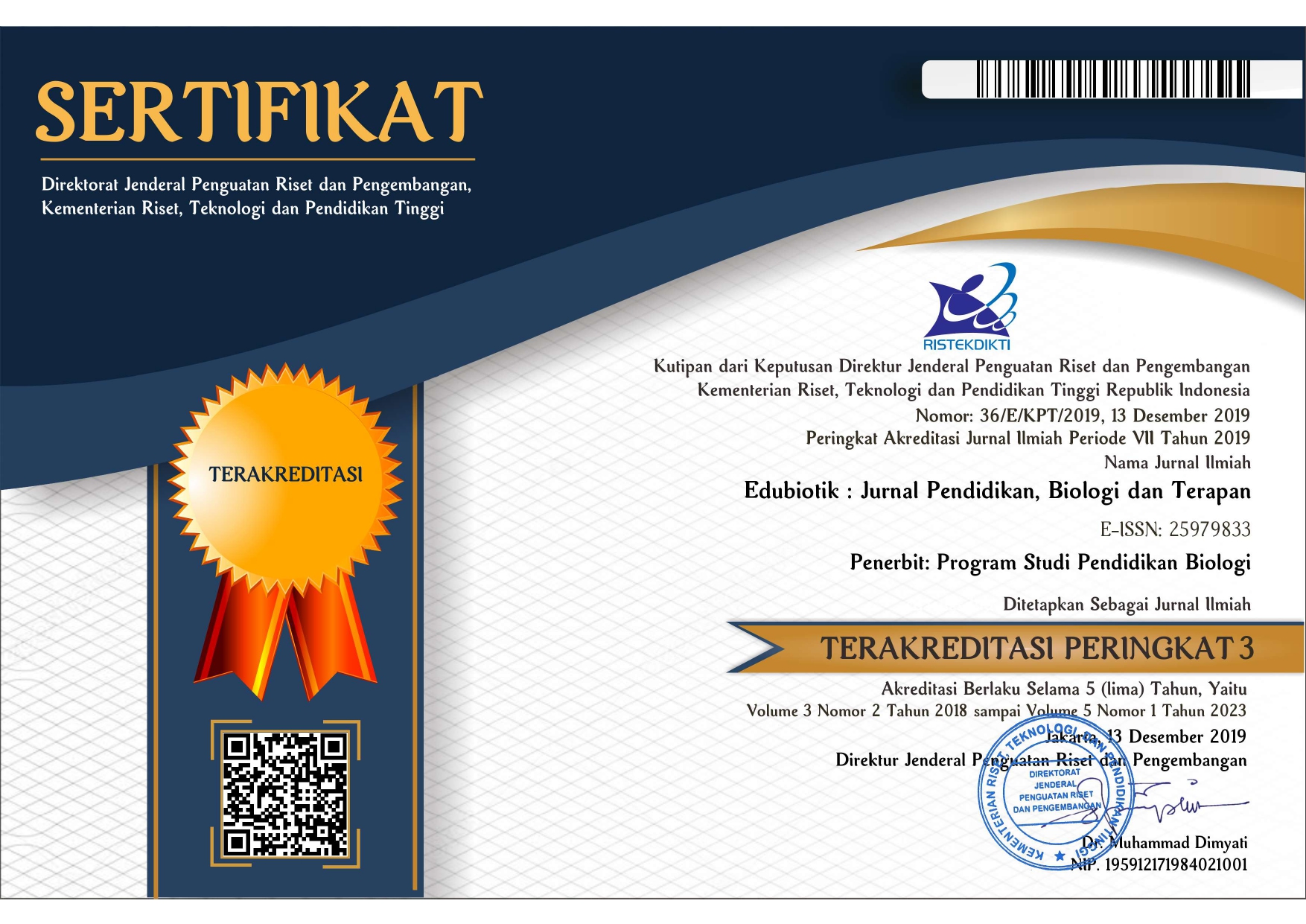Conceptual knowledge and argumentation skills of biology students in animal physiology courses
Abstract
Argumentation facilitates students’ cognitive activities as they construct scientific knowledge. Studies related to the relationship between conceptual knowledge and argumentation skills in biology learning, especially in animal physiology courses, are still rarely carried out. The primary aim of this study was to determine the correlation between students’ mastery of biology concepts and argumentation skills. A correlational research design was employed. The research sample consisted of 106 fourth semester Biology Education students. The students’ mastery of biology concepts and argumentation skills were evaluated using valid and reliable instruments. Conceptual knowledge measured in this study refers to students’ ability to explain their responses to essay tests on cognitive concepts. Besides, this study also assessed students’ ability to participate in scientific debates and compose written arguments based on the Toulmin's Argumentation Pattern (TAP) framework. This study indicates an association between students’ grasp of biology concepts and their argumentation skills in the ADI class. The regression equation derived from the data analysis is y = 0.608x + 39.05 with a reliability value of 0.179. Meanwhile, there is no strong correlation between conceptual knowledge and argumentation skills in RQA, ADI-Integrated RQA, or traditional classes. This can be influenced by a variety of factors, including students’ inability to adapt and adjust rapidly to the steps introduced into the learning models. Improving argumentation quality can be accomplished through the use of active and innovative learning models or strategies.
References
Amin, A. M. (2017). Pre Service Biology Teachers’ Argumentation Skills in Animal Physiology Laboratory. Jurnal Pengajaran MIPA, 22(2). https://doi.org/10.18269/jpmipa.v22i2.8696
Amin, A. M. (2020). Pengaruh Model Reading, Questioning, and Answering (RQA) Dipadu Argument-Driven Inquiry (ADI) pada Kemampuan Akademik Berbeda terhadap Motivasi, Keterampilan Berpikir Kritis, Keterampilan Metakognitif, Keterampilan Argumentasi, dan Penguasaan Konsep Biolo. Disertasi Tidak Diterbitkan. Malang: Universitas Negeri Malang.
Amin, A. M. (2022). Self-Efficacy Mahasiswa Biologi Setelah Penerapan Model WE-ARe (Warm-up, Exploring, Argumentation, Resume). Jurnal AL-Nafis, 2(1), 117–128. http://journal.iain-ternate.ac.id/index.php/Al-Nafis/article/view/768
Amin, A. M., & Adiansyah, R. (2020). Identification of Preservice Biology Teachers’ Metacognitive Awareness and Metacognitive Skills. Journal of Physics: Conference Series, 1511 01202, 1–8. https://doi.org/10.1088/1742-6596/1511/1/012029
Amin, A. M., & Adiansyah, R. (2018). Lecturers ’ Perceptions of the Empowerment of Students ’ Argumentation Skill Lecturers ’ Perceptions of the Empowerment o f Students ’ Argumentation Skill and the Challenges of Teaching the Skill to Students. 5th International Conference on Research, Implementation and Education of Mathematics and Science (ICRIEMS), 111–116.
Amin, A. M., Adiansyah, R., & Hujjatusnaini, N. (2021). Students’ Argumentation Quality and Argumentation Skill Biology Education Student. Jurnal Bioedukatika, 9(2), 84–92. https://doi.org/doi.org/10.26555/bioedukatika.v9i2.20675
Amin, A. M., & Corebima, A. D. (2016). Analisis Persepsi Dosen terhadap Strategi Pembelajaran Reading Questiong and Answering (RQA) dan Argument-Driven Inquiry (ADI) pada Program Studi Pendidikan Biologi di Kota Makassar. Prosiding Seminar Nasional II Tahun 2016, Kerjasama Prodi Pendidikan Biologi FKIP Dengan Pusat Studi Lingkungan Dan Kependudukan (PSLK) Universitas Muhammadiyah Malang, March, 333–347. https://www.researchgate.net/publication/321144722
Amin, A. M., Corebima, A. D., Zubaidah, S., & Mahanal, S. (2016). Analisis Penguasaan Konsep dan Metode Pembelajaran dalam Pembelajaran Calon Guru Biologi Di Kota Makassar. Prosiding Seminar Nasional Ke-3 Biologi, IPA, Dan Pembelajarannya, October 2016, 1192–1200. https://www.researchgate.net/publication
Amin, A. M., & Rosmiaty, E. (2017). Improving Students’ Characters, Cognitive Achievement, and Attention span through RQA (Reading, Questiong and Answering) Strategy on Cell Biology Subject. Prosiding International Conference on Mathematics and Science Education, 881–887.
Andriani, Y., & Riandi. (2015). Peningkatan Penguasaan Konsep Siswa Melalui Pembelajaran Argument Driven Inquiry pada Pembelajaran IPA Terpadu di SMP Kelas VII. Edusains, 7(2), 114–120. https://doi.org/10.15408/es.v7i2.1578
Anita, Afandi, & Tenriawaru, A. . (2019). Pentingnya Keterampilan Argumentasi di Era Ledakan Informasi Digital. Prosiding Seminar Nasional FKIP Universitas Tanjungpura, August, 1740–1746.
Anwar, Y., Susanti, R., & Ermayanti. (2019). Analyzing Scientific Argumentation Skills of Biology Education Students in General Biology Courses. Journal of Physics: Conference Series, 1166(012001), 1–5. https://doi.org/10.1088/1742-6596/1166/1/012001
Apriliani, N., Suharsono, & Diella, D. (2019). The Correlation of Concept Mastery and Student ’ s Argumentation Skills on Sub Concept of Human. Prosiding Seminar Nasional Biologi, Saintek, Dan Pembelajarannya (SN-Biosper), 326–331.
Bathgate, M., Crowell, A., Schunn, C., Cannady, M., & Dorph, R. (2015). The Learning Benefits of Being Willing and Able to Engage in Scientific Argumentation. International Journal of Science Education, 37(10), 1590–1612. https://doi.org/10.1080/09500693.2015.1045958
Darmayanti, V. (2015). Profil Penguasaan Pembelajaran RQA (Reading, Questioning, and Answering) oleh Guru IPA SMP di Jember. Seminar Nasional Fisika Dan Pembelajarannya, 1–8.
Demircioglu, T., & Ucar, S. (2015). Investigating the Effect of Argument-Driven Inquiry in Laboratory Instruction. Educational Sciences: Theory & Practice, 15(1), 267–283. https://doi.org/10.12738/estp.2015.1.2324
Dwiretno, G., & Setyarsih, W. (2018). Pembelajaran Fisika Menggunakan Model Argument Driven Inquiry (ADI) Untuk Melatihkan Kemampuan Argumentasi Ilmiah Peserta Didik. Inovasi Pendidikan Fisika, 7(2), 337–340. https://jurnalmahasiswa.unesa.ac.id/index.php/5/article/view/24505/22426
Faize, F. A., Husain, W., & Nisar, F. (2018). A Critical Review of Scientific Argumentation in Science Education. Eurasia Journal of Mathematics, Science and Technology Education, 14(1), 475–483. https://doi.org/10.12973/ejmste/80353
Fatah, H. A., Suprapto, P. K., & Meylani, V. (2020). Kemampuan Kognitif dan Literasi Sains: Sebuah Model Pembelajaran Argument-Driven Inquiry pada Materi Jaringan Tumbuhan. JPBIO (Jurnal Pendidikan Biologi), 5(1), 80–87. https://doi.org/10.31932/jpbio.v5i1.590
Hasnunidah, N., Susilo, H., Irawati, M., & Suwono, H. (2020). The Contribution of Argumentation and Critical Thinking Skills on Students’ Concept Understanding in Different Learning Models. Journal of University Teaching and Learning Practice, 17(1), 1–11. https://doi.org/https://doi.org/10.53761/1.17.1.6
Hayati, N. (2017). Hubungan Keterampilan Membaca Kritis dengan Keterampilan Menulis Argumentasi Siswa Kelas XI SMA Negeri 12 Padang. Jurnal Kepemimpinan Dan Pengurusan Sekolah, 2(2), 141–148. http://ejurnal.stkip-pessel.ac.id/index.php/kp/article/view/150/98
Heng, L. L., Surif, J., & Seng, H. C. (2014). Individual Versus Group Argumentation: Student’s Performance in a Malaysian Context. International Education Studies, 7(7), 109–124. https://doi.org/10.5539/ies.v7n7p109
Hidayat, W., Wahyudin, & Prabawanto, S. (2018). Improving Students’ Creative Mathematical Reasoning Ability Students through Adversity Quotient and Argument Driven Inquiry Learning. Journal of Physics: Conference Series, 948(012005), 1–5. https://doi.org/10.1088/1742-6596/948/1/012005
Imaniar, B. O., & Astutik, S. (2019). Analisis Kemampuan Argumentasi Siswa SMP pada Pembelajaran IPA. Seminar Nasional Pendidikan Fisika, 4(1), 92–96.
Kadayifci, H., & Celik, A. (2016). Implementation of Argument-Driven Inquiry as an Instructional Model in a General Chemistry Laboratory Course. Science Education International, 27(3), 369–390. https://eric.ed.gov/?id=EJ1118430
Llewellyn, D. (2013). Teaching High School Science Through Inquiry and Argumentation. In Corwin a SAGE Company. https://doi.org/10.1007/s10956-006-9037-z
Marhamah, O. S., Nurlaelah, I., & Setiawati, I. (2017). Penerapan Model Argument-Driven Inquiry (ADI) dalam Meningkatkan Kemampuan Berargumentasi Siswa pada Konsep Pencemaran Lingkungan Di Kelas X SMA Negeri 1 Ciawigebang. Quagga : Jurnal Pendidikan Dan Biologi, 9(2), 39–45. https://doi.org/10.25134/quagga.v9i02.747
Mulyani, R., Hernawati, D., & Ali, M. (2021). Keterampilan Komunikasi Interpersonal Dan Hasil Belajar: Sebuah Studi Korelasi Siswa Menengah Atas. Jurnal Bio Educatio, 6(1), 82–92. https://doi.org/10.31949/be.v6i1.3033
Noviyani, M., Kusairi, S., & Amin, M. (2017). Penguasaan Konsep dan Kemampuan Berargumentasi Siswa SMP pada Pembelajaran IPA dengan Inkuiri Berbasis Argumen. Jurnal Pendidikan: Teori, Penelitian, Dan Pengembangan, 2(7), 974–978. https://doi.org//10.17977/jptpp.v2i7.9692
Nur’aini, F., Rosyadi, I., Arafah, M., Safrina, M., Isnaini, N., Evendi, R., & Sugiharto, B. (2019). Perbandingan Kemampuan Argumentasi Mahasiswa Pendidikan Biologi. Biosfer: Jurnal Tadris Biologi, 10(2), 179–188. https://doi.org/10.24042/biosfer.v10i2.5663
Ogan-Bekiroglu, F., & Eskin, H. (2012). Examination of the Relationship between Engagement in Scientific Argumentation and Conceptual Knowledge. International Journal of Science and Mathematics Education, 10(6), 1415–1443. https://doi.org/10.1007/s10763-012-9346-z
Osborne, J., Erduran, S., & Simon, S. (2004). Enhancing the Quality of Argumentation in School Science. Journal of Research in Science Teaching, 41(10), 994–1020. https://doi.org/10.1002/tea.20035
Prastio, U. Y., & Hasnunidah, N. (2019). Pengaruh Argument-Driven Inquiry terhadap Kesadaran Metakognisi dan Hasil Belajar Kognitif Siswa SMP. Jurnal Bioterdidik, 7(5), 1–10. http://jurnal.fkip.unila.ac.id/index.php/JBT/article/view/18217
Probosari, R. M., Ramli, M., & Sajidan. (2016). Improving Scientific Argumentation through the Hierarchy of Inquiry. Proceeding of International Conference on Teacher Training and Education, 1(1), 1–7.
Rahmadhani, K., Priyayi, D. F., & Sastrodihardjo, S. (2020). Kajian Profil Indikator Kemampuan Argumentasi Ilmiah pada Materi Zat Aditif dan Zat Adiktif. Natural: Jurnal Ilmiah Pendidikan IPA, 7(1), 1–9. https://doi.org/10.30738/natural.v7i1.7587
Roviati, E., & Widodo, A. (2019). Kontribusi Argumentasi Ilmiah dalam Pengembangan Keterampilan Berpikir Kritis. Titian Ilmu: Jurnal Ilmiah Multi Sciences, 11(2), 56–66. https://doi.org/10.30599/jti.v11i2.454
Sadler, T. D., & Fowler, S. R. (2006). A Threshold Model of Content Knowledge Transfer for Socioscientific Argumentation. Science Education, 90(6), 986–1004. https://doi.org/10.1002/sce.20165
Safira, C. A., Hasnunidah, N., & Sikumbang, D. (2018). Pengaruh Model Pembelajaran Argument-Driven Inquiry (ADI) terhadap Keterampilan Argumentasi Siswa Berkemampuan Akademik Berbeda. Assimilation: Indonesian Journal of Biology Education, 1(2), 46–51. https://doi.org/10.17509/aijbe.v1i2.13046
Sampson, V., Grooms, J., & Walker, J. P. (2011). Argument-Driven Inquiry as a Way to Help Students Learn How to Participate in Scientific Argumentation and Craft Written Arguments: An Exploratory Study. Science Education, 95(2), 217–257. https://doi.org/10.1002/sce.20421
Sarira, P. M., Priyayi, D. F., & Astuti, S. P. (2019). Hubungan Argumentasi Ilmiah dan Hasil Belajar Kognitif pada Penerapan Model Problem Based Learning (PBL). Edu Sains Jurnal Pendidikan Sains & Matematika, 7(2), 1–10. https://doi.org/10.23971/eds.v7i2.1258
Setiono, S. (2017). Optimalisasi Penguasaan Konsep, Kemampuan Berinkuiri dan Sikap Ilmiah Mahasiswa Melalui Modul Berbasis Inkuiri. BIOSFER : Jurnal Biologi Dan Pendidikan Biologi, 1(1), 10–15. https://doi.org/10.23969/biosfer.v1i1.266
Simbolon, M., Henukh, A., & Nikat, R. F. (2020). Correlation Between Mastery of Concepts and Argumentation Skills of High School Students. Advances in Social Science, Education and Humanities Research, 473, 417–420. https://doi.org/10.2991/assehr.k.201014.090
Siska, S., Triani, W., Yunita, Y., Maryuningsih, Y., & Ubaidillah, M. (2020). Penerapan Pembelajaran Berbasis Socio Scientific Issues Untuk Meningkatkan Kemampuan Argumentasi Ilmiah. Edu Sains Jurnal Pendidikan Sains & Matematika, 8(1), 22–32. https://doi.org/10.23971/eds.v8i1.1490
Sumarni, E. N., Widodo, A., & Solihat, R. (2017). Stimulating Students’ Argumentation using Drawing-Based Modeling on the Concept of Ecosystem. International Journal of Science and Applied Science: Conference Series, 2(1), 98–104. https://doi.org/10.20961/ijsascs.v2i1.16688
Vera, Anwar, Y., & Ermayanti. (2021). The Correlation between Scientific Argumentation with Viruses Learning Outcomes of Senior High School Student. Biosfer: Jurnal Pendidikan Biologi, 14(1), 54–64. https://doi.org//10.21009/biosferjpb.10998
Wahdan, W. Z., Sulistina, O., & Sukarianingsih, D. (2017). Analisis Kemampuan Berargumentasi Ilmiah Materi Ikatan Kimia Peserta Didik SMA, MAN, Dan Perguruan Tinggi Tingkat I. J-PEK (Jurnal Pembelajaran Kimia), 2(2), 30–40. https://doi.org/10.17977/um026v2i22017p030





.png)
2.png)

1.jpg)


